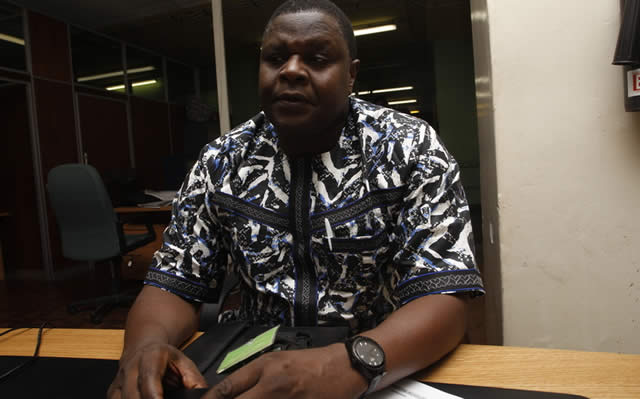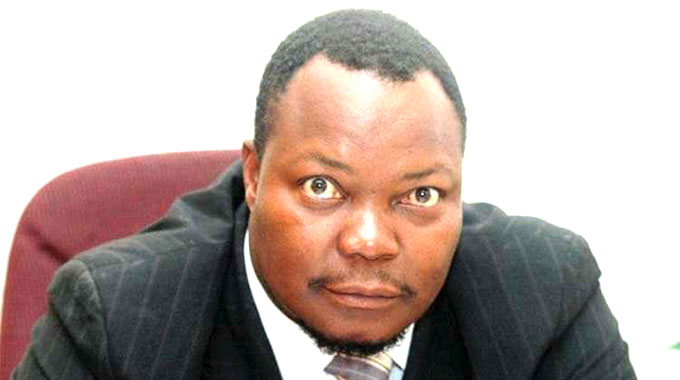Mutsauki on unique mission to help NOCs

FORMER Zimbabwe Olympic Committee chief executive, Robert Mutsauki, has embarked on a unique mission. Mutsauki, who also served the continental Association of National Olympic Committees of Africa (ANOCA) as technical director, is now an independent sports management consultant. With the knowledge and experience he gained during his many years of service, he has set out ambitious goals to help NOCs get out of their comfort zones and transform their management styles to match the best international practices. Here, he speaks to The Herald Sports Editor, Collin Matiza, about his new mission:
Q: When, why and how did you get into the sports management consultancy business?
A: I left the post of the Association of National Olympic Committees of Africa (ANOCA) technical director at the end of June 2014, having been appointed to the post on 1st January 2011. I then decided to become an independent consultant focusing on strategic planning for sports entities, primarily National Olympic Committees (NOCs) because I wanted to impact positively on the all-round performance of these entities in a sustainable manner.
I also knew that Olympic Solidarity (OS) supported and funded NOC strategic planning projects, among other initiatives. In addition, I knew that there was great potential, opportunity and an appetite for strategic planning among African NOCs. It was therefore strategic in my view to focus on this niche market, and at the same time, I also recognised the fact that getting recognition and support from OS could be a critical success factor in my new business venture, a formidable new challenge by any measure.
It did not take long for me to be registered (officially recognised) by OS, it just took a month or so actually to get the greenlight from OS and the proverbial journey of a thousand miles had not only begun in earnest but was in fact well and truly underway.
Q: What is your verdict on your latest assignment, namely facilitating the National Olympic Committee of Zambia (NOCZ) strategic planning workshop?
A: The NOCZ strategic planning workshop was generally a smooth process and the overwhelming impression of the workshop delegates as reflected in their responses to the workshop evaluation questionnaire is that it was a resounding success.
I stand guided by the verdict of the workshop delegates, and I can attribute the success of the workshop to adequate preparation and contributions by all the parties involved in executing this important project.
Ultimately, however, the success of a planning workshop is premised on whether the set objectives are achieved at the end of the day. The verdict in this case is an affirmative one by all accounts. This is not to say there were no challenges encountered in the process, but mitigating and resolving the challenges as they emerge becomes part of the success measures.
Q: What are some of the main challenges you tend to encounter as a consultant and facilitator on a project of this nature?
A: There are quite a few challenges which could stand in the way of progress and success on such a project. Firstly, if the preparations fall short of requirements, then it may be difficult to ‘get the show off the ground’, so to say. The longer it takes to gain traction and momentum, the more difficult it will be to get to the biblical ‘promised land’.
The workshop delegates are never a homogeneous group so as a facilitator you have to contend with the diversity of views, approaches and conceptualisation among the delegates. The ever-present challenge of time constraints versus the mammoth task at hand always comes to the fore and as a facilitator you find yourself having to perform a delicate ‘balancing act’ to meet and manage expectations. This requires a lot of skill and tact. How do you avoid stifling deliberations among the delegates and at the same time ensure that the desired outcomes are generated within the limited time available for the planning workshop? How do you get delegates to appreciate the distinction between ordinary workshops which are meant to provide awareness or education at the end of the day and a planning workshop which is a means or methodology to develop an organisation’s strategic plan or road map in three days? How do you get delegates to be invested in the planning workshop process as soon as possible? At what point do you intervene or move things along and how best can this be done? What type of guidance do you provide as a facilitator and how do you remain neutral during deliberations and avoid ‘descending into the arena’ as it were? How do you deal with what you may consider to be a misleading intervention by a workshop delegate during deliberations? What responsibility does a facilitator have when it comes to the quality of the planning workshop outcomes? In other words, does the facilitator have the responsibility of ensuring that a credible and sound strategic plan is developed and if so, how is this to be done while at the same time ensuring ownership or buy-in by the various stakeholders of the NOCZ for instance? Can the delegates or stakeholders eat their cake and have it at the same time and are there no trade-offs in this complex process? Is this not a case of give and take?
Q: Give us a few critical success factors to be embraced by a strategic planning workshop facilitator?
A: One could start with the preparation process for the planning workshop which should be formally and systematically guided by the facilitator ensuring that all workshop requirements are in place well before the workshop gets underway. In line with best practice the involvement, engagement and consultation of the key stakeholders is essential to ensure not only ownership and buy-in by the stakeholders but more importantly, effective implementation of the new strategic plan.
The facilitator should also ensure their own adequate preparation, as lack of preparation can easily manifest itself during the workshop sessions leading to loss of credibility, confidence and respect by workshop delegates some of whom might be very knowledgeable on the subject. As they say, one does not get a second opportunity to make a first impression and so the impact or lack of impact by the facilitator during the early stages of the planning workshop is most likely to hold sway despite lapses or valiant efforts at later stages.
The facilitator should be able to withstand scrutiny by participants in every aspect including impeccable delivery of presentations, mastering the subject matter, having pertinent information at one’s fingertips, being able to think on one’s feet and also outside the box, keeping everybody engaged, giving pertinent examples, being pragmatic, ensuring the sessions are interactive, a generous exercise of patience, listening more and genuinely embracing contributions by all, ability and willingness to read, interpret and readily adapt to changing situations as the workshop unfolds, being able to say the right thing at the right time, having a thick skin and tolerance for criticism, appropriate application of principles and concepts and many other imponderables.
The bottom line is that the facilitator should impress workshop delegates and win them over. The million-dollar question is how best to do this. The personal delivery style of the facilitator may also impact positively or negatively on the workshop delegates, so what is important is to adapt as much as possible one’s style of delivery to the specific audience rather than the other way round.
Q: What do you attribute your current status as a leading and respected authority or expert on strategic planning within the Olympic Movement to?
A: It is a multiplicity of factors at play including my unending quest for knowledge and excellence, consistent professionalism, keeping up with emerging trends in strategic planning, being creative and innovative, remaining focused, ensuring relevance and positive impact, leveraging opportunities to best advantage, thinking and acting strategically, ability to deliver to and beyond expectations, reliability, integrity, being principled, learning from others, learning from my own mistakes, a photographic memory, a powerful voice, a good sense of humour, big picture as well as a pragmatic, give and take approach.
I am the biggest critic of my own work, and I derive pleasure from poking holes in my own performance, presentations, arguments and reports. In this respect, I have no difficulty laughing at and chiding myself when I fall short, and I try to avoid being in denial and justifying my shortcomings.
I also make every effort to keep an open mind despite my strong views which unfortunately I tend to express strongly and passionately as well from time to time, and this may not be palatable to some within the audience. I do not believe in pretence, grandstanding, playing to the gallery, or a popularity contest.
This may not go down well with some, but this is vintage RM for you . . . what you see is what you get! The combination of factors outlined above have served me well over the years. Some may think that I became an overnight success, but nothing could be further from the truth. As they say, it can take up to twenty years to become an overnight success.
Let me highlight the fact that after many years of working on how to improve the performance of NOCs through strategic management, I have finally established a working model, hypothesis style, which is however continuously tested and refined through due process and best practice in strategic planning.
I believe that I am now at a stage in my consultancy career where I can set the pace as well as the benchmark for others to emulate. The various NOCs in Africa which I collaborate with have many similarities but of course they also have some unique features.
However, many of them are operating at the same level of development and hence such NOCs tend to come up with similar strategic priorities during their planning sessions which in my view is neither surprising nor problematic. Moreover, they are all in the same Olympic System with most of them heavily dependent on funding from the International Olympic Committee, specifically its Olympic Solidarity arm, which could rightly be described as the lifeline for many NOCs.
My reading of the situation, based on my collaborative engagements with various NOCs, is that these entities are gravitating to the centre, displaying congruence and convergence in essence but nevertheless retaining their unique identities and propositions.
I find myself having to deal with the same or similar issues and challenges across the continent, but the biggest challenge is not the development of the strategic plan, (even though this can be quite challenging) but rather its implementation or execution.
Implementation is an internal process of the NOC which requires a committed and empowered champion as it is an integral part of the change management process within the NOC. The challenge is that a substantial number of NOCs are either unwilling or unable to get out of the comfort zone and change the existing business or organisational culture. Until this uncomfortable step is embraced, some brilliant strategic plans will continue to gather dust on the shelves with stagnation or even regression sadly prevailing.
Q: Any parting words?
A: It has been said that a poor strategy which is robustly implemented is better than a brilliant strategy which is not implemented at all. I fully agree with this contention. It is high time that NOCs go beyond brandishing strategic plans and start boasting about improved performance, relevance, competitiveness and impact arising from effective implementation of their strategic plans. There must be a return on such an investment and in any case a strategic plan is not an end in itself but rather a means to an end.
Finally let me say that, to demonstrate my commitment to the cause of strategic management, I have so far trained and certified some 60 strategic planning facilitators in Malawi, Nigeria, Zambia and Zimbabwe respectively, through the four NOCs. This initiative is meant to ensure knowledge and skills transfer coupled with on-going mentorship and more significantly to provide local expertise and support National Sport Federations and other sport entities in developing and implementing strategic plans for improved organisational and athlete performance.
The impact so far has been a mixed bag but if one is being honest, overall, the verdict would be that much more has to be done on the ground.
Nevertheless, this initiative is set to be extended to other African NOCs in due course as the concept cannot be faulted, in my humble view. It once again boils down to the ever-present challenge of execution, execution and execution!










Comments